Premium Only Content

Episode 2207: Traditionalism verses Progressivism - Part 3 of 3
Walt: We Have Sharon with us on this episode and she will take it from here explaining how as a Protestant convert she see’s the modern Catholic Church as being more progressive than what she left. So with no further adue please take it from here Sharon and I may ask some questions or provide comments at the end.
Sharon:
Sounds good Walt. I titled this episode
Tradition & Progress:
The Modern Catholic Church in a Progressive Light
Lets define Progessive:
Progressive as an adjective. Its meaning is as follows:
happening or developing gradually or in stages; proceeding step by step.
"a progressive decline in popularity"
Similar to continuing, continuous, increasing, growing, developing, ongoing, intensifying, accelerating, escalating, gradual, step by step,cumulative
2.
(of a group, person, or idea) favoring or implementing social reform or new, liberal ideas.
Progressive as a noun.
1.
a person advocating or implementing social reform or new, liberal ideas.
"people tend to present themselves either as progressives or traditionalists on this issue"
Similar: liberal, reformer, reformist, innovator, progressivist, progressionist, left-winger, leftist, neoteric
Today we are diving into a fascinating and perhaps surprising topic: how the modern Catholic Church has become more progressive than many Protestant denominations.
We'll look at various aspects of Church teaching, social issues, and how the Catholic Church has navigated the contemporary landscape while holding on to its traditional roots.
Let's begin with a little context. Historically, the Catholic Church has been perceived as conservative, especially compared to some Protestant denominations that emerged during the Reformation. However, in recent decades, (since the 1960’s Vatican II) the Catholic Church, under the guidance of recent Popes (Pope Paul VI, John Paul II, and Pope Francis and notice I am leaving Pope Benedict out of this group) and the Vatican II Council, has adopted positions and practices that might be seen as progressive, particularly in the areas of social justice, economic equity, environmental stewardship (our carbon footprint) and interfaith dialogue.
Sharon: Social Justice and Economic Equity
The Catholic Church has long emphasized the importance of social justice and economic equity, inspired by the teachings of Christ and the early Church. However, this recent Pope has brought renewed vigor to these issues.
Let’s consider the papacy of Pope Francis. He has been an outspoken advocate for the poor and marginalized, calling for a more equitable distribution of resources and criticizing unbridled capitalism. What does that sound like to you, Walt? Socialism? Communism? His encyclical "Laudato Si'" addresses environmental degradation (Global warming) and global inequality, urging all people to take action to protect our common home. This focus on systemic issues and the moral responsibility of individuals and nations can be seen as progressive, especially compared to some Protestant traditions that may emphasize personal responsibility over systemic critique.
What does the Bible teach about the earth? Did God create the earth for man or man for the earth? We do have a moral obligation and responsibilty to sustain our environment, however, the same people that are trying to restrict and dictate how we ordinary people live are the same people who are destroying it. Lets use the Amazon rainforest for a simple example. They are destroying the balance of nature by leveling the forest to mine for plutonium for the electric cars. This is Pope Francis’s continent! Should he not be speaking out against that? Especially since they are using child labor and the mining is killing them. Hypocrits they are!
Walt: Excerpt from Pope Francis' "Laudato Si'"
This emphasis on systemic change and the moral obligation to care for the environment positions the Catholic Church as a leader in progressive social thought.
Excerpt from "Laudato Si'" (Paragraph 139):
"Ecology studies the relationship between living organisms and the environment in which they develop. This necessarily entails reflection and debate about the conditions required for the life and survival of society, and the honesty needed to question certain models of development, production, and consumption. It cannot be emphasized enough how everything is interconnected. Time and space are not independent of one another, and not even atoms or subatomic particles can be considered in isolation. Just as the different aspects of the planet – physical, chemical, and biological – are interrelated, so too living species are part of a network which we will never fully explore and understand. A good part of our genetic code is shared by many living beings. It follows that the fragmentation of knowledge and the isolation of bits of information can actually become a form of ignorance, unless they are integrated into a broader vision of reality."
Pope Francis' encyclical "Laudato Si'" has been seen as problematic for some traditional Catholics and priests for several reasons:
Walt 1. Focus on Environmental Issues
Some traditionalists feel that the encyclical's focus on environmental issues diverts attention from what they see as the Church's primary mission: the salvation of souls and the preservation of traditional moral teachings. They may perceive the emphasis on climate change, biodiversity, and ecological concerns as secondary or even irrelevant compared to doctrinal and spiritual matters.
Sharon: If the church focused on the salvation of souls, the virtues, and moral responsibilities…there is no need for this to be an issue. Good, knowledgeable people who have morals and virtues tend to appreciate what God has given them and will care for the earth God put them on.
Walt 2. Economic and Political Views
"Laudato Si'" critiques certain economic and political systems, particularly unregulated capitalism and consumerism, which the Pope sees as contributing to environmental degradation and social inequality. Traditionalists who align with more conservative economic views may feel uncomfortable with these critiques, seeing them as overly political or as a departure from what they believe should be the Church’s more neutral or supportive stance towards free markets.
Sharon :Again, this is none of the church’s business. They should be focusing on their internal needs to support what the church was set up to do…care for the sick, care for orphans, set up and manage good catholic schools. These have declined since the 60’s. These laws were put in place in the old testament beginning in Exodus 22:22 which states, Do not take advantage of a widow or the fatherless. If you do and they cry out to me I will certainly hear their cry. My anger will be aroused and I will kill you with the sword and your wives will become widows and your children fatherless.
In Deuteronomy 10:18 states he executes justice for the fatherless and the widow. And loves the sojourner giving him food and clothing. He ensures that orphans and widows receive justice.
When the church stopped tending to these matters, the government took over and we how that has played out.
Walt 3. Call for Global Action and Solidarity
The encyclical calls for global action and solidarity, urging international cooperation to tackle environmental issues. Some traditionalists may view this as an endorsement of globalism, which they oppose on political grounds, fearing that it could undermine national sovereignty or lead to centralized, potentially secular, control over environmental policies.
Sharon: Again, the church needs to worry about the church and saving souls and teaching the doctorines to the faithful.
Walt 4. Integration of Science and Faith
While the Catholic Church has a history of engaging with science, "Laudato Si'" places a strong emphasis on contemporary scientific consensus regarding climate change and environmental degradation. Some traditionalists are skeptical of this consensus and prefer a more cautious approach, fearing that aligning too closely with current scientific theories could lead to future conflicts with faith-based perspectives.
Sharon: If we as Catholics believe what the Bible teaches which is that earth was created for a time and purpose. Christ will return and there will be a new heaven and a new earth. Therefore, the only thing that matters is saving souls for that time when Christ does return to claim His faithful, right?
Science is based on evolution…so who cares! The theory of evolution is flawed so why would be not believe that the theory they are trying to sell us on climate change is not flawed as well because it is based on a flawed theory to begin with.
Walt 5. Perceived Shift in Priorities
The encyclical's broad focus on environmental ethics, economic justice, and social issues may be seen by traditionalists as a shift away from traditional Catholic priorities. They may argue that issues like abortion, family life, and sexual ethics should receive more attention and that the emphasis on environmentalism dilutes the Church’s moral authority on these matters.
Sharon: Absolutey! Again, the salvation of souls, teaching the docterines and caring for those souls is what the focus should be on. Christ said in Mark 16:15 And he said unto them, Go ye into all the world and preach the Gospel to every creature, and in Matthew 28:20 Teaching them to observe all things whatsoever I have commanded you. Jesus didn’t tell them to push for government or global policies especially if they go against our Catholic beliefs. This is why we stand up against abortion, the degradation of the family through homosexuality and sex before marriage. In addition, I believe what the Bible says about the end of the earth as we know it for a new heaven and a new earth. In Revelation 21 John describes, Then I saw a new heaven and a new earth for the first heaven and the first earth had passed away and there was no longer any sea. In 2 Peter 3:10 he says, But the day of the Lord will come as a thief in the night in which the heavens will pass away with a great noise and the elements will melt with fervent heat both the earth and the works that are in it will be burned up. Therefore since all these things will be dissolved, what manner of persons ought you to be in holy conduct and godliness looking for and hastening the coming of the day of God. This is all just white noise and destraction.
Walt: 6. Critique of Modern Lifestyles
Pope Francis' critique of modern lifestyles, particularly consumerism and the pursuit of material wealth, challenges deeply ingrained cultural norms. Traditional Catholics who see Western civilization and its economic system as fundamentally aligned with Christian values might find this critique difficult to accept, viewing it as an unwarranted attack on their way of life.
Sharon: In Matthew 26:11 Jesus said The poor you will have with you always. This was after Judas complained that the oil that Mary was putting on Jesus’ feet and head could be sold to help the poor. Which we know is not what Judas would do with that money! The church has always helped the poor, the orphans and the widows. However, since the decline of priest and nuns which had orders specifically dedicated to those areas, who is there to do it? As for consumerism, people need to stop and think about what they need and stop allowing these marketers of convincing them they can’t live without it.
Walt: 7. Interconnectedness and Ecological Spirituality
The encyclical’s emphasis on the interconnectedness of all creation and its call for an "ecological conversion" may be seen by some traditionalists as introducing elements of New Age spirituality or pantheism. They might be concerned that this focus could blur the distinction between Creator and creation, potentially leading to theological confusion.
Sharon: Learn your scripture and teach it to those souls you save! Its pretty simple and laid out in the scriptures. In Genesis 2:15 The Lord God took the man and put him in the garden of Eden to work it and keep it. And out of the ground the Lord God formed every beast of the field, and every fowl of the air, and brought them unto Adam to see what he would call them and whatsoever Adam called every living creature that was the name thereof.
Walt: "Laudato Si'" challenges traditional Catholics and priests to rethink their approach to environmental and social issues, calling for a holistic and integrated view of creation, economy, and society. While many see this as a positive and necessary development, traditionalists may perceive it as a problematic shift in focus, priorities, and theological emphasis. The encyclical’s progressive stance on these issues reflects broader tensions within the Church about how to engage with contemporary global challenges while maintaining fidelity to traditional teachings and values.
In contrast, some Protestant denominations, particularly those with a strong focus on individual salvation and less hierarchical structure, may not have adopted such a unified and vocal stance on environmental issues. This doesn't mean Protestants don't care about the environment, but the centralized and authoritative voice of the Catholic Church allows for a more coordinated and impactful approach.
Sharon: As a conservative Baptist, we focused on caring for the environment and rejected the global warming scientific teachings. We were taught that the earth had a lifespan and would be replaced by a new heaven and a new earth. Again, morality and responsibility. Global warming has become it own religion.
You know, they are removing plastic bags from stores or charging you for them. However, look how many Amazon trucks you see on the road daily. They are delivery packages in plastic bags. Poop bags for dogs are plastic and everyone has them. How has any of this helped their narrative. Just a thought.
Walt: Interfaith Dialogue and Inclusivity
Interfaith dialogue is another area where the Catholic Church has made significant strides. The Second Vatican Council's document "Nostra Aetate" marked a watershed moment in the Church's approach to other religions. It acknowledges the truth and holiness in other religions and encourages dialogue and cooperation. This inclusive approach has continued under subsequent Popes, fostering relationships with Jewish, Muslim, Hindu, and other faith communities.
Sharon: Christ accepted people from other religions but only to convert them. Christ saved people where they were but He didn’t let them stay there. He told his disciples in Matthew 10:14 whosoever shall not receive you, nor hear your words, when ye depart out of that house or city, shake off the dust from your feet.
Walt: This openness contrasts with some Protestant denominations that may hold more exclusive views about salvation and truth. The Catholic Church's commitment to interfaith dialogue demonstrates a progressive understanding of global religious pluralism and the need for peaceful coexistence and mutual respect.
A document, written by Pope Paul VI in 1965 during the Second Vatican Council, addresses the Church's relationship with other religions, emphasizing respect, dialogue, and understanding among different faith traditions. It was titled "Nostra Aetate" is Latin for "In Our Time." This title reflects the document's focus on the contemporary relationships between the Catholic Church and non-Christian religions.
Walt: Excerpt from "Nostra Aetate"
By embracing dialogue and recognizing the value in other faith traditions, the Catholic Church presents a model of inclusivity and respect in a pluralistic world.
Text Excerpt from "Nostra Aetate" (Section 1):
"In our time, when day by day mankind is being drawn closer together, and the ties between different peoples are becoming stronger, the Church examines more closely her relationship to non-Christian religions. In her task of promoting unity and love among men, indeed among nations, she considers above all in this declaration what men have in common and what draws them to fellowship."
This document has been a source of contention for traditional Catholics and priests for several reasons:
Walt: 1. Perceived Relativism
Traditionalists often view "Nostra Aetate" as a departure from the Church's historic teaching that Catholicism is the one true faith. The document acknowledges the presence of truth and holiness in other religions, which some interpret as religious relativism. They worry that this could undermine the Church's claim to possess the fullness of revealed truth and weaken evangelistic efforts.
Sharon: St Justin said, No one who is rightly minded turns from true belief to false.
Walt: 2. Interfaith Dialogue Concerns
The encouragement of interfaith dialogue and cooperation in "Nostra Aetate" can be seen as problematic by those who believe it dilutes Catholic doctrine. Traditionalists argue that dialogue should not lead to compromising the distinctiveness of Catholic teachings or suggest that all religions are equally valid paths to salvation.
Sharon: Pope Francis and others since Vatican II are looking for a one world religion where everyone gets along and is equal. We are not equal…God has bestowed on us different gifts some which will put one above the other. We are to satisfied in the ranking He has placed us. If other religions do not like the Catholic faith, so be it. Christ said in John 18-19, If the world hates you, know that it has hated me first. If you were of the world the world would love its own. But because you are not of this world, but I chose you out of this world therefore the world hates you.
He also said in 14:27 Peace I leave with you, my peace I give you. I do not give as the world gives. Do not let your hearts be troubled and do not be afraid.
Christ is telling us to be strong. We are living for another world or to make it heaven. We are not supposed to join ranks with heretics or go along to get along. This world will not see peace or justice until Christ returns. In Psalms 85 10-13 it says Love and faithfulness meet together righteousness and peace kiss each other. Faithfulness springs forth from the earth and righteousness looks down from Heaven.
3. Impact on Liturgical Practices
The spirit of openness and inclusivity promoted by "Nostra Aetate" influenced various liturgical reforms. Traditionalists often criticize these changes, such as the shift from Latin to vernacular languages in the Mass, as they feel these changes have led to a loss of reverence, mystery, and the universality of the liturgy.
Sharon: My first thought on the mass being in Latin: if everyone in the world…not just the US…prayed the mass in Latin, it goes up to God unified and as one prayer. How beautiful is that. Additionally, parishes with different nationalities struggle especially during the holidays as to which language they are going to say the mass in…Spanish, English, Italian, German, Polish. This would not be an issue if the mass were said in Latin. People of different nationalities can learn the Latin mass as well as I can. And, how beautiful would it be that all nations and tongues could worship as one before God?! Wouldn’t that bring all Catholics closer together and closer to God? Is that not what heaven will be like? Also, they removed the Gregorian chant that was so beautiful, reverent and majestic for sing songy lyrics that are catchey and happy. Although the words may be correct, the melody belongs on the playground with small childrens nursery rhymes. Totally not worthy to sing before the King of Kings.
Walt: 4. Relations with Judaism
"Nostra Aetate" explicitly addresses the relationship between the Church and Judaism and acknowledging the shared heritage and ongoing covenant of the Jewish people. Some traditionalists misinterpret this as downplaying the necessity of conversion to Christianity for salvation, despite the document's careful theological distinctions. Christ created a new covenant and therefore the old covenant was over. There is no need to support heresy through relationship. The Apostles primary responsibility was to convert and not dialogue.
Sharon: In John 3-5 it says, Verily, verily I say unto thee, Except a man be born of water and of the Spirit, He cannot enter into the Kingdom of God. Jesus said this to Nicodemus.
In Matthew 7: 13-14 Jesus said Enter ye in at the strait gate Because the strait is the gate and narrow is the way which leadeth unto life and few will find it
It is our mission to lead people to the gate not look at their map to change our course.
Walt: 5. Ecumenical Implications
The document's ecumenical tone is seen by traditionalists as problematic because it emphasizes commonalities over differences. They fear this could lead to doctrinal compromise and a lack of clarity about the necessity of the Catholic Church for salvation.
Sharon: It has led to compromise. When I go to a Novus Ordo mass, I just want to leave. I apologize to Christ the entire time I am there. It is so happy slappy, so loose, so irreverent and the music in most, not others, is like a rock n roll band. No organ. No solemnity. There is not reverence for the priest as he walks down the aisle before or after. People do not bow or cross themselves as the cross passes. They wave and say hello to the priest and he says hello back. All the glorious prayers have been modernized, mushed together and changed. I try to follow from my missile but it goes so quickly. The consecration which should be so holy is done in about 3 seconds. Where are the prayers at the foot of the altar? Why is the priest sitting in a chair for half the mass while lay people…men and women…read the epistle, gospel, the weekly bulletin? And, why are these people on the altar to begin with? What is taking the eucharist in the hand from a eucharistic minister?? Too much. This is Protestantism at its finest.
Walt: 6. Authority and Continuity
Traditional Catholics often emphasize the continuity of Church teaching. They argue that "Nostra Aetate" represents a break with past teachings, particularly those that were more exclusive in their view of other religions. This perceived discontinuity can lead to questions about the authority and infallibility of the Second Vatican Council's documents.
While "Nostra Aetate" was intended to foster understanding and dialogue among different faiths, these aspects can be seen as challenging for traditional Catholics who prioritize the exclusive claims of the Church and its traditions. The tension arises from balancing the Church's mission to evangelize with its call to engage respectfully with a religiously plural world.
Sharon: The world can be as religiously pural as it chooses. We do not have to give up our beliefs for those of others. It is not what Christ taught nor what he commanded his Apostles to do as previously stated.
Science and Faith
Walt: The relationship between science and faith is another area where the Catholic Church has shown a progressive attitude. The Church has a long history of engagement with science, dating back to the Middle Ages. The Church was significant in the creation and support of certain sciences but today the science trumps the faith for the Church. Today, the Vatican Observatory and the Pontifical Academy of Sciences exemplify the Church's commitment to scientific inquiry. Why?
Pope John Paul II's recognition of evolution as "more than a hypothesis" and Pope Francis' acceptance of the Big Bang theory as compatible with Christian faith show a progressive understanding that faith and science can coexist and inform each other. In contrast, some Protestant denominations adhere to literal interpretations of the Bible that reject evolutionary theory and other scientific findings.
The relationship between science and faith, as perceived by the Catholic Church, has evolved significantly, particularly since the Second Vatican Council. This more progressive attitude is seen as problematic by traditional Catholic faithful and priests for several reasons:
1. Perceived Compromise on Scriptural Interpretation
Traditional Catholics often adhere to a more literal interpretation of Scripture. When the Church acknowledges scientific theories such as evolution or the Big Bang, which can seem to conflict with a literal reading of the Genesis creation accounts, it is seen as undermining the authority and inerrancy of the Bible.
Sharon: If the Account in the Bible is the truth, and there can only be one truth, then science is wrong about the creation of the world! Simple.
2. Historical Tensions and Galileo Affair
There is a historical context of tension between the Church and scientific advancements, most famously exemplified by the Galileo affair. The entire affair was misinterpreted but most progressive Catholics only believe what the modernists pump into them. The Church insisted Galileo prove his position.
Sharon: His theory contradicted the Bible, right? Claiming that the sun remained motionless in the center of the universe and re interrupting scripture to match his theory?
Walt:3. Concerns Over Modernism
Modernism, which includes the reconciliation of faith with contemporary scientific understanding, was condemned by Pope Pius X in the early 20th century. Traditionalists often see modern scientific acceptance as a revival of Modernist tendencies, diluting the purity of Catholic doctrine and leading to a more secularized Church.
Sharon: Science has become a religion. Dare anyone to second guest it. So many things are theories. It seems that God’s Word is not good enough for people. They chose to hang on the science with is flawed.
Walt:4. Anthropocentrism and the Special Place of Humanity
Some traditional Catholics emphasize the unique creation of humans in the image of God, which they feel is compromised by the theory of evolution. Accepting that humans share a common ancestry with other life forms can be seen as diminishing the special role of humanity in God’s creation.
Sharon: Dah. God created us in his image. Man was the only one…not the animals, not the creatures of the sea or the air. Man.
Walt: 5. Fear of Moral Relativism
There is a concern that accepting scientific explanations for phenomena traditionally explained by faith could lead to moral relativism. If the Church appears to be yielding to scientific consensus, traditionalists worry that this could extend to moral teachings, leading to a more relativistic approach to doctrine and ethics.
Sharon: Look where it has led already. Everyone has their own truth. There is no One Truth. Like Pilate said to Christ, What is truth? Isn’t that where it has led us to today?
Walt: 6. Educational and Catechetical Implications
Traditional Catholics often prefer that education and catechesis emphasize faith-based explanations for natural phenomena. The Church’s endorsement of modern science might be seen as undermining efforts to educate the faithful in a manner that prioritizes religious teachings over secular scientific viewpoints.
For traditional Catholic faithful and priests, the Church’s progressive attitude towards science represents a potential dilution of doctrinal purity, an undermining of scriptural authority, and a drift towards modernism and relativism. This perspective highlights the tension between maintaining traditional beliefs and engaging with contemporary scientific understanding, reflecting broader concerns about the direction of the Church in the modern world.
Sharon: Is not the tension here? If it has been true traditionally for over 2000 years, why is it wrong to still believe it or better yet, why are traditionalists not allowed to have an opinion? Who are the closed minded? The liberals. It is their way or the highway.
Walt: Pastoral Care and Modern Issues
Pastoral care in the modern world presents unique challenges, and the Catholic Church has taken steps to address issues such as sexual ethics, family life, and the role of women. Pope Francis' apostolic exhortation "Amoris Laetitia" which means "The Joy of Love." addresses the complexities of modern family life, calling for compassion and understanding in pastoral care. While the Church maintains its teachings on the sanctity of marriage and family, it also emphasizes the importance of mercy and pastoral sensitivity.
This balanced approach contrasts with the often more rigid positions seen in some Protestant communities. The Catholic Church's willingness to engage with complex modern issues in a nuanced and compassionate way can be seen as a progressive step forward.
The Catholic Church's progressive approach to pastoral care and modern issues has been a source of contention for some traditional Catholic faithful and priests for several reasons:
Walt:1. Perceived Dilution of Doctrine
Traditional Catholics often fear that a progressive approach to pastoral care could lead to a dilution of core doctrines. They worry that emphasizing mercy, compassion and understanding in pastoral practices might undermine the Church's definitive teachings on issues like marriage, sexuality, and family life. For example, the pastoral approach in "Amoris Laetitia" regarding divorced and remarried Catholics receiving Communion has sparked significant debate and concern among traditionalists.
Sharon: As it should spark debate. God is the same yesterday, today and tomorrow. He is the I am not the I am today and tomorrow I will be!
Walt:2. Moral Relativism
A more compassionate and individualized approach to pastoral care can be seen by traditionalists as a step towards moral relativism. They are concerned that adapting pastoral practices to contemporary realities might lead to a situation where moral absolutes are compromised, leading to inconsistencies in upholding the Church's teachings across different contexts.
Sharon: Moral absolutes are compromised. Look at the blessings of same sex couples.
Walt: 3. Liturgical Practices
Changes in liturgical practices aimed at making them more accessible and engaging can be problematic for traditionalists who value the reverence, solemnity, and mystery of traditional liturgies, such as the Tridentine Mass. They may view these changes as concessions to modern sensibilities that detract from the sacredness of the liturgy.
Sharon: They are a concession. What’s the saying…if you give an inch, they’ll take a mile! Look at your church, Walt. Every first Sunday they do not have the traditional Latin Mass. Look at the institute. They would not concede so your Bishop shut them down. One day we will not be able to attend a Latin Mass. This is why these issues are so important. This is why people need to speak up and more importantly, pray!
Walt: 4. Sexual Ethics
The Church's approach to sexual ethics, including its stance on homosexuality, contraception, and cohabitation, has been a contentious issue. While the Church's teachings remain unchanged, the emphasis on pastoral sensitivity and accompaniment, as encouraged by Pope Francis, can be perceived by traditionalists as weakening the clear moral boundaries established by previous papacies.
Sharon: These are mortal sins. The priest should be bellowing from the pulpit the truth not worrying about people’s feeling. If a child was reaching for a flame, would you worry about hurting their feelings by screaming No! Stop! Or grabbing them to pull them away? We are talking about eternal flames of fire in Hell.
Walt: 5. Role of Women
Progressive attitudes towards the role of women in the Church, including discussions about their participation in ministries and leadership roles, are often met with resistance from traditionalists. They believe that such changes could lead to an erosion of the distinct roles of men and women as understood in traditional Catholic teaching.
Sharon: I am sorry listeners, even as a former Baptist…women are to support and uphold and encourage. They do not belong on the altar or in leadership positions (Deacons, priests) in the church.
Walt: 6. Engagement with Contemporary Issues
The Church's engagement with contemporary social issues, such as climate change, economic inequality, and immigration, while grounded in Catholic social teaching, is sometimes viewed by traditionalists as prioritizing social activism over spiritual and doctrinal purity. They may feel that the Church is becoming too involved in political matters at the expense of its spiritual mission.
Sharon: Again, the church is to care for the sick, for the widows, for the orphans and to teach and save souls. This was Christ’s command.
Walt: 7. Perceived Lack of Continuity
Traditional Catholics value continuity with the past. They may see progressive pastoral approaches as a break from tradition and a departure from the practices and teachings that have defined the Church for centuries. This perceived lack of continuity can lead to a sense of alienation and concern about the future direction of the Church.
For traditional Catholic faithful and priests, the Church's progressive attitudes in pastoral care and addressing modern issues raise concerns about doctrinal integrity, moral relativism, and continuity with tradition. These concerns reflect broader tensions within the Church between adapting to contemporary realities and maintaining the timeless truths of the faith. Balancing pastoral sensitivity with doctrinal fidelity remains a complex and often contentious challenge within the Catholic community.
Closing Remarks
In conclusion, while the Catholic Church has lost its traditions roots, its recent actions and teachings under the Pontific of Pope Francis reflect a progressive stance on many contemporary issues. From social justice and environmental stewardship to interfaith dialogue and the relationship between faith and science, the Church demonstrates a dynamic and evolving understanding of its role in the modern world. In short, the modern Catholic Church has out progressed the Protestant Church.
Thank you for joining us on this episode and we hope this exploration has provided insight into how the Catholic Church, while remaining true to its core teachings, embraces progress and change. Until next time, may God bless you and keep you. Now go out and be Catholic less its progressive influences.
-
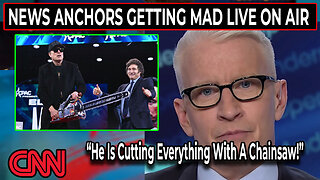 16:25
16:25
TSPLY
1 day agoNew CNN / MSNBC Meltdown Moments Of Getting Mad At Donald Trump In February
24.5K18 -
 8:33
8:33
scoutthedoggie
5 hours agoAirsoft War Games Scotland
28.3K4 -
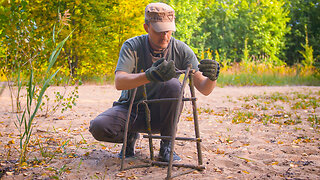 4:56
4:56
Kirill MultitoolOfficial
1 day ago $2.70 earnedSurvival TIPS and usefull bushcraft DIY in the wild
43.9K3 -
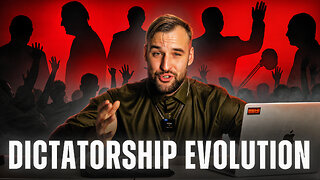 27:25
27:25
ArturRehi
1 day agoThis is How Dictatorships are Formed
23.7K5 -
 59:35
59:35
AlaskanBallistics
18 hours ago $0.63 earnedI Love this Gun Episode # 11
16.7K1 -
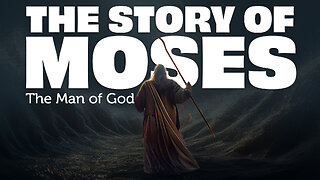 1:21:01
1:21:01
BibleUnbound
21 hours agoThe Complete Story of Moses: The Man of God
21.5K4 -
 15:56
15:56
Chris From The 740
9 hours ago $0.01 earnedFenix LR36R Review: The Most Powerful Light I've Ever Tested!
13K1 -
 1:01:47
1:01:47
Wendy Bell Radio
10 hours agoPet Talk With The Pet Doc
20.7K6 -
 2:23:45
2:23:45
Game On!
20 hours ago $10.49 earnedTom Brady approves of President Trump calling out Governors wanting men in women's sports!
54.6K14 -
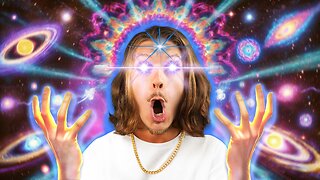 5:34
5:34
BIG NEM
18 hours agoFrom Atheist to Seeing Auras: My Unlikely Spiritual Awakening 🤯
6.44K2